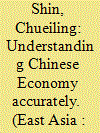| Srl | Item |
| 1 |
ID:
086461


|
|
|
|
|
| Publication |
2008.
|
| Summary/Abstract |
Although Margaret Keck and Kathryn Sikkink formulated the concept of a transnational advocacy network (TAN) as a tight-knit community of transnational nongovernmental individuals with shared beliefs and identities, they did not go on to trace the dynamics of the development of such a network. This paper claims that "shared values" is an insufficient explanation for network-building. It further expands on the analytical framework for the development of a TAN by discussing the following three main themes: (1) the political opportunity that catalyzes the emergence of the activists; (2) the network "glue" that facilitates cohesion and closeness in the TAN; and (3) the network organization that defines the participation and problems related to role distribution with respect to the activists in the TAN. This study examines the case of the anti-Yasukuni TAN comprising activists from Taiwan, South Korea, and Japan, and finds that the TAN was transformed in terms of its function and strategy as activists of different national origins joined it. From the evidence gleaned from structured interviews, it was found that activists from Taiwan instilled the TAN with a revolutionary character that facilitated the mobilization of wider social support. Ambitious activists from South Korea then added a greater international dimension to the TAN. Although the groups from Taiwan and South Korea tended to accelerate the development of the TAN and diversify it, the Japanese group reminded the developing TAN of its original target. Thus, a TAN is a far more complex entity with a mixture of multinational and cultural attributes rather than a simple and steady network formed by transnational actors with shared beliefs, as Keck and Sikkink have posited.
|
|
|
|
|
|
|
|
|
|
|
|
|
|
|
|
| 2 |
ID:
134189


|
|
|
|
|
| Publication |
2014.
|
| Summary/Abstract |
How and to what extent can China be more accurately understood? Is China best understood as it is or through theories that appear to reveal its nature? John Wong is an example of the former approach, a pursuer of economic realism in the discipline of economic analysis. This paper first describes John Wong's conceptual model of Chinese economic development, which consists of three major components: Singapore as the reference point; economic scale as the first adjusted variable; and economic development phase as the second variable. The paper further explores sources of his choice of methodology through the positionality of his research. He cannot be neatly categorized in any existing school of economic analysis of the Western academic tradition but pursues his accurate understanding of China through pragmatism; his institutionalized research position constitutes the methodological foundation for his research strategy and conceptual framework.
|
|
|
|
|
|
|
|
|
|
|
|
|
|
|
|